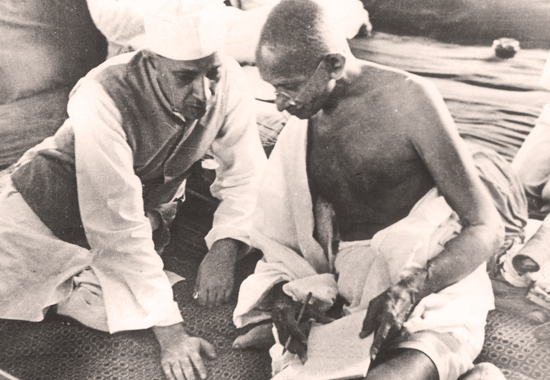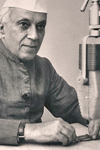|

HAPPIER DAYS - JAWAHARLAL NEHRU AND MOHANDAS GANDHI IN 1942
The Light Has Gone Out of Our Lives
Go here for more about
 Jawaharlal Nehru.
Jawaharlal Nehru.
Go here for more about
 Mohandas Gandhi.
Mohandas Gandhi.
Go here for more about
 Nehru's The Light Has Gone Out of Our
Lives Speech.
Nehru's The Light Has Gone Out of Our
Lives Speech.
It follows the full text transcript of
Jawaharlal Nehru's The Light Has Gone Out of Our
Lives radio address, national broadcast from All India
Radio, New Delhi, India - January 30, 1948.

 |
Friends and
Comrades, |
The light has gone
out of our lives and there is darkness
everywhere. I do not know what to tell you and
how to say it. Our beloved leader, Bapu as we
called him, the Father of the Nation, is no
more. Perhaps I am wrong to say that.
Nevertheless, we will never see him again as we
have seen him for these many years. We will not
run to him for advice and seek solace from him,
and that is a terrible blow, not to me only, but
to millions and millions in this country. And it
is a little difficult to soften the blow by any
other advice that I or anyone else can give you.
The light has gone out, I said, and yet I was
wrong. For the light that shone in this country
was no ordinary light. The light that has
illumined this country for these many years will
illumine this country for many more years, and a
thousand years later, that light will be seen in
this country and the world will see it and it
will give solace to innumerable hearts. For that
light represented something more than the
immediate past, it represented the living, the
eternal truths, reminding us of the right path,
drawing us from error, taking this ancient
country to freedom.
All this has happened when there was so much
more for him to do. We could never think that he
was unnecessary or that he had done his task.
But now, particularly, when we are faced with so
many difficulties, his not being with us is a
blow most terrible to bear.
A madman has put an end to his life, for I can
only call him mad who did it, and yet there has
been enough of poison spread in this country
during the past years and months, and this
poison has had an effect on people’s minds. We
must face this poison, we must root out this
poison, and we must face all the perils that
encompass us, and face them not madly or badly,
but rather in the way that our beloved teacher
taught us to face them.
The first thing to remember now is that none of
us dare misbehave because he is angry. We have
to behave like strong and determined people,
determined to face all the perils that surround
us, determined to carry out the mandate that our
great teacher and our great leader has given us,
remembering always that if, as I believe, his
spirit looks upon us and sees us, nothing would
displease his soul so much as to see that we
have indulged in any small behavior or any
violence.
So we must not do that. But that does not mean
that we should be weak, but rather that we
should, in strength and in unity, face all the
troubles that are in front of us. We must hold
together, and all our petty troubles and
difficulties and conflicts must be ended in the
face of this great disaster. A great disaster is
a symbol to us to remember all the big things of
life and forget the small things of which we
have thought too much. In his death he has
reminded us of the big things of life, the
living truth, and if we remember that, then it
will be well with India…
It was proposed by some friends that Mahatmaji’s
body should be embalmed for a few days to enable
millions of people to pay their last homage to
him. But it was his wish, repeatedly expressed,
that no such thing should happen, that this
should not be done, that he was entirely opposed
to any embalming of his body, and so we decided
that we must follow his wishes in this matter,
however much others might have wished otherwise.
And so the cremation will take place on Saturday
in Delhi city by the side of the Jamuna [Jumna]
River. On Saturday forenoon, about 11.30 a.m.,
the bier will be taken out at Birla House and it
will follow a prescribed road and go to the
Jamuna [Jumna] River. The cremation will take
place there at about 4 p.m. The place and the
route will be announced by radio and the Press.
People in Delhi who wish to pay their last
homage should gather along this route. I will
not advise too many of them to come to Birla
House, but rather to gather on both sides of
this long route from Birla House to the Jamuna
[Jumna] River. And I trust that they will remain
there in silence without any demonstrations.
That is the best way and the most fitting way to
pay homage to this great soul. Also, Saturday
should be a day of fasting and prayer for all of
us.
Those who live elsewhere, out of Delhi and in
other parts of India, will no doubt take such
part as they can in this last homage. For them
also, let this be a day of fasting and prayer.
And at the appointed time for cremation, that is
4 p.m. on Saturday afternoon, people should go
to the river or to the sea and offer prayers
there. And while we pray, the greatest prayer
that we can offer is to take a pledge to
dedicate ourselves to the truth, and to the
cause for which this great countryman of ours
lived and for which he has died. That is the
best prayer that we can offer him and his
memory. That is the best prayer we can offer to
India and ourselves.
JAI HIND. [Long Live India.]

More History
|
|